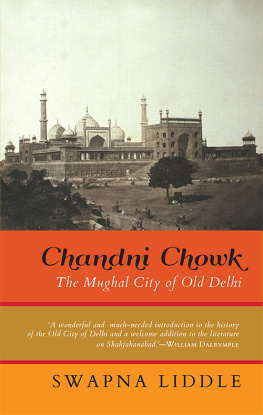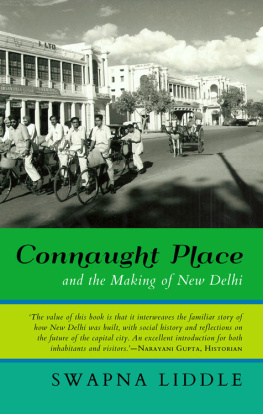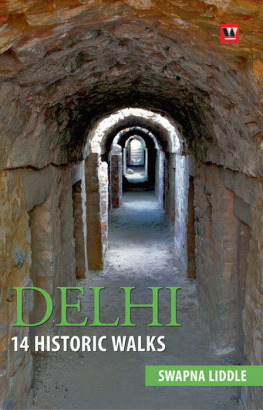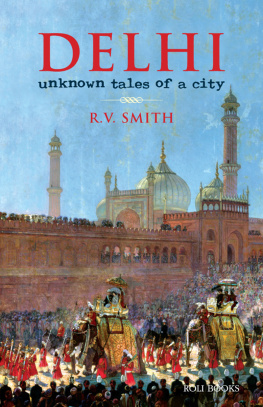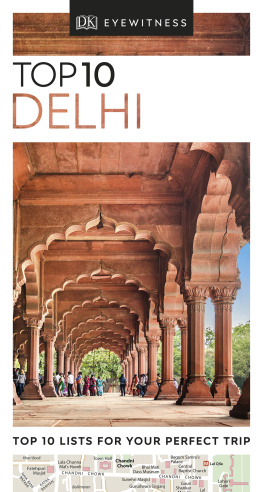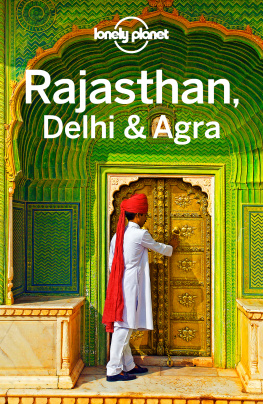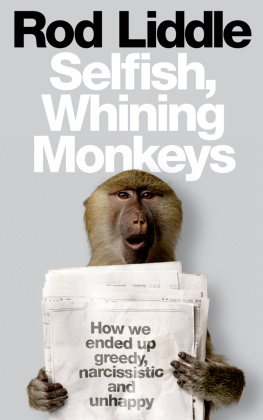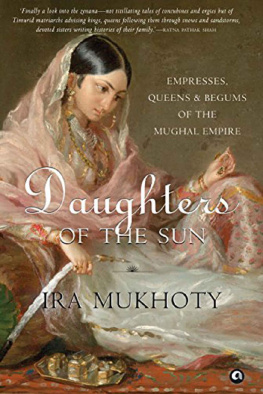Swapna Liddle - Chandni Chowk: The Mughal City of Old Delhi
Here you can read online Swapna Liddle - Chandni Chowk: The Mughal City of Old Delhi full text of the book (entire story) in english for free. Download pdf and epub, get meaning, cover and reviews about this ebook. year: 2017, publisher: Speaking Tiger Books LLP, genre: Religion. Description of the work, (preface) as well as reviews are available. Best literature library LitArk.com created for fans of good reading and offers a wide selection of genres:
Romance novel
Science fiction
Adventure
Detective
Science
History
Home and family
Prose
Art
Politics
Computer
Non-fiction
Religion
Business
Children
Humor
Choose a favorite category and find really read worthwhile books. Enjoy immersion in the world of imagination, feel the emotions of the characters or learn something new for yourself, make an fascinating discovery.
- Book:Chandni Chowk: The Mughal City of Old Delhi
- Author:
- Publisher:Speaking Tiger Books LLP
- Genre:
- Year:2017
- Rating:4.5 / 5
- Favourites:Add to favourites
- Your mark:
- 100
- 1
- 2
- 3
- 4
- 5
Chandni Chowk: The Mughal City of Old Delhi: summary, description and annotation
We offer to read an annotation, description, summary or preface (depends on what the author of the book "Chandni Chowk: The Mughal City of Old Delhi" wrote himself). If you haven't found the necessary information about the book — write in the comments, we will try to find it.
Chandni Chowk: The Mughal City of Old Delhi — read online for free the complete book (whole text) full work
Below is the text of the book, divided by pages. System saving the place of the last page read, allows you to conveniently read the book "Chandni Chowk: The Mughal City of Old Delhi" online for free, without having to search again every time where you left off. Put a bookmark, and you can go to the page where you finished reading at any time.
Font size:
Interval:
Bookmark:



MY STUDY OF THE HISTORY OF DELHI IS BASED ON THE WORK of a large number of scholars. In the list are more books and articles than can be included in specific footnotes, and many lectures and conversations from which I have benefited. This work is an acknowledgement of all the scholarly research that has been done on the subject. For my own research specifically, I would like to thank my PhD supervisor Mukul Kesavan, for his support and encouragement, but most of all because he always asked the right questions.
The shape this book has taken is directly owing to Renuka Chatterjee, who commissioned it and commented on the drafts. Maithily Doshis work on the layout has given it a polished finished form. Gourab Banerji departed from his usual policy of careful distance from my work, to make helpful comments and suggestions. I would like to thank them all.
I also gratefully acknowledge the support of YES BANK and YES Institute, who have contributed to the publication of this book.
YES INSTITUTE IS PROUD TO SUPPORT EMINENT HISTORIAN, Swapna Liddles Chandni Chowk: The Mughal City of Old Delhi which brings to life the majestic history of Old Delhi and tracks the trajectories of the old city which have shaped North Indias cultural landscape. As someone who has grown up in Delhi, amidst all its fascinating heritage and monuments, I can truly identify with the authors narrative of the multifaceted, vibrant and rich history of the city.
At YES BANK, we are dedicated to the promotion, development and conservation of Indias cultural heritage through our YES Culture initiative, which is an integral part of our practicing think-tank, YES Institute. At YES Institute, glocalisation of ideas is driving new age innovations and solutions for Indias socio-economic growth and development. We are indeed uniquely positioned to drive socio-economic development through promotion of Indias creative and innovative culture forms.
Taking lessons from Delhis grand intellectual and cultural history can be truly beneficial for the development of our country. YES Institute and YES Cultures initiatives and efforts are focused on Indias rich and diverse heritage. Our sustained efforts in this vital area are aimed at promoting national pride and developing India into a truly community-driven, sustainable destination.
Swapna Liddles lucid style succeeds in addressing all of us in an easy manner and the vast range of sources that she draws on brings the stories of Old Delhi alive. Her love for the city of Delhi shines through and this is echoed in her long-standing work at INTACH. This work has significantly shaped conservation and heritage education; it has also spearheaded heritage awareness in India.
Old Delhi embodies centuries of growth and diverse leadership within its historic tapestry. This has resulted in an environment of new juxtaposed with old, and several different communities living together. The heritage structures and people that live in these landscapes come together to represent the citys rich history, traditions and beautiful craftsmanship.
Promoting citizen engagement with our tangible and intangible heritage must make heritage accessible to all. Civil society participation and awareness of our heritage is vital for the preservation and conservation of these heritage sites.
I am confident this unique book will encourage you to relish and visit Old Delhis cultural treasures and appreciate them as important assets in the life of our national capital.
| New Delhi, November 2016 | RANA KAPOOR Managing Director & CEO, YES BANK and Chairman, YES Institute |

Map of Shahjahanabad and its surroundings, published in 1857.
THIS BOOK IS ABOUT ONE OF THE GREAT HISTORIC CITIES of the world, and spans some three centuries of its past. Writing the history of a city such as Delhi is both exciting and challenging. Delhi has had a rich urban past, and what is particularly interesting is the fact that at different points of time several different sites were chosen by various political powers to found new settlements or cities. It is commonly said that there have been seven historic cities of Delhi. The truth is, there have actually been more than seven different sites that have been developed as capitals by ruling powers.
Of these, the seventeenth-century Mughal city of Shahjahanabad is of particular interest for two main reasons. Firstly, its street plan and major buildings are still mostly intact, which enables us to understand its layout and design. Secondly, it is still a living city. Though the lives of the people inhabiting it have changed over the centuries, the citys markets, lanes and courtyard houses, to quite an extent, continue to be used as they were in Shahjahans time.
Today, Shahjahanabad has been subsumed under the gigantic sprawl of metropolitan Delhi. On the map of modern Delhi, it occupies a fairly small dot. Yet it has an identity that is distinct. Popularly known as Chandni Chowk, or Old Delhi, its name conjures up romantic narrow streets, a variety of street food and exotic markets. And increasingly, not only tourists but residents of other parts of Delhi want to experience this city and its culture in all its richness. Proof of this lies in the popularity of the many different historic tours, heritage walks, food walks, photography workshops and the like, that focus on this historic precinct.
While it is interesting to explore the contemporary space that is Chandni Chowk today, it is equally fascinating to explore its history, and in fact the one complements the other. My own engagement with this city has been at multiple levels. Many years of personal exploration in its intricate lanes have led me to a familiarity and appreciation of the physical space of the city, and of its contemporary culture. At another level, a PhD thesis on the intellectual and cultural life of nineteenth century Delhi prompted me to look at this citys past with the rigour of an academic.
My work with the Delhi Chapter of the Indian National Trust for Art and Cultural Heritage (INTACH) has involved a concern with the need to preserve Shahjahanabads many historic structures. An interesting project with which I was involved, was the production of a detailed dossier that formed part of the application to the United Nations Educational, Scientific and Cultural Organization (UNESCO), for inclusion of Shahjahanabad on the list of World Heritage Cities. The writing of the historical background that was part of this dossier prompted me to examine closely and think deeply about what was special about this historic city. Though that project did not reach fruition, the work on it has been rewarding in other ways, and deserves to be shared.
In a way, this book is the result of my interaction with Shahjahanabad on these various planes. For many years I have been leading heritage walks through Shahjahanabad, with a view to raising awareness about the need to preserve its rich history and traditions. An important part of the narrative on such walks is the history of the citys many sites. Events and characters from different eras of the history of the city are intimately connected to the spaces one walks through today. Invariably, an important question that is posed to a walk leader at the end of the walk isis there a book where I can read about the history of Shahjahanabad?
Font size:
Interval:
Bookmark:
Similar books «Chandni Chowk: The Mughal City of Old Delhi»
Look at similar books to Chandni Chowk: The Mughal City of Old Delhi. We have selected literature similar in name and meaning in the hope of providing readers with more options to find new, interesting, not yet read works.
Discussion, reviews of the book Chandni Chowk: The Mughal City of Old Delhi and just readers' own opinions. Leave your comments, write what you think about the work, its meaning or the main characters. Specify what exactly you liked and what you didn't like, and why you think so.

